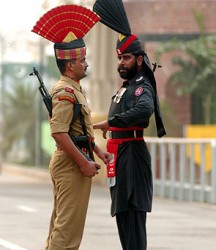 Indians and Pakistanis are discussing the leadership crisis in their respective countries, but for different reasons and with different implications. India’s inability to wield influence on the world stage is being blamed on the lack of good leadership. In Pakistan, people feel that the political leaders have failed to instill confidence and provide direction when the country is consumed by the threat of terrorism. Are these leadership demands signs of widening and maturing democracy in the two countries? Or are the Indians and Pakistanis wanting to re-live the hope and optimism characterizing the era of Nehru and Jinnah? Whatever may be the rationale, the demand for better leadership is showing different traits of the public in India and Pakistan.
Indians and Pakistanis are discussing the leadership crisis in their respective countries, but for different reasons and with different implications. India’s inability to wield influence on the world stage is being blamed on the lack of good leadership. In Pakistan, people feel that the political leaders have failed to instill confidence and provide direction when the country is consumed by the threat of terrorism. Are these leadership demands signs of widening and maturing democracy in the two countries? Or are the Indians and Pakistanis wanting to re-live the hope and optimism characterizing the era of Nehru and Jinnah? Whatever may be the rationale, the demand for better leadership is showing different traits of the public in India and Pakistan.
Dawn Columnist, Cyril Almedia wrote a timely article, “Where are you, our leaders”, on the October 23, 2009. The opening lines of his column are illustrative of what many Pakistanis are thinking:
As the country burns, parents agonize over whether to send their children to school or not, offices of businesses local and foreign ramp up their security measures, the average citizen thinks twice before venturing into crowded locales or government buildings, a simple question for our leaders: where are you? Where are you, President Zardari? Where are you, Prime Minister Gilani? Where are you, Nawaz Sharif?
While making an eloquent plea to the Pakistani leadership for reassuring the common people, Cyril adds, “politics existed yesterday and it will exist tomorrow. Right now the people are scared and they need their leaders to show some leadership.”
The recent post at CHUP, titled “An Era of Citizen Resolve” highlights how the scores of Pakistanis are ready to confront and fight terrorists, a challenge evaded by the country’s leadership. Pakistani students from Universities across the country launched a group named Jaag Meeray Talib-e-Ilm requesting the Government to reopen universities and provide adequte security.
Across the disputed border in India, Hindustan Times-CNN IBN Survey shows that 41% of the population believes that lack of leadership is holding back India from becoming a world power. The survey raised a question, which appeared strange to me: “Has the moral leadership that Nehru and Gandhi stood for ended in India? Are there no such towering figures to give India the much-needed identity?” I am not sure how many Indians would be happy if Nehru and Gandhi held the reigns of power in today’s India.
It is widely believed that despite impressive rates of economic growth, Indian leadership has not been able to tackle the challenges of criminalization of politics, lack of infrastructure and high rates of illiteracy. The inability of the leadership to tackle basic issues of governance tends to pull-back India on the world stage.
Indians and Pakistanis share a common sentiment in their distinct demands: a desire for responsive, responsible and dynamic leadership. But this is where the similarity ends. The demands made by the people of the two countries on their respective leaderships are startlingly different: for Pakistanis it’s an issue of national survival while the Indians desire national assertiveness on the world stage. Moreover, the case for stronger leadership in Pakistan is not the topic of television debates like in India; it is a demand voiced at street protests and every-day conversations. Recent public demonstrations in India are usually parochial; the demands affect only a specific social, cultural or economic group. National demands, on issues that affect the entire country have been more common in Pakistan than in India during the past decade.
Whether its the airline pilots going on strike or threat of protests by IIT faculty; whether its farmers raising demands against SEZ or people of Tamil Nadu criticizing the Center’s Sri Lanka policy, only local concerns tend to galvanize Indians. Have we ever witnessed protests aganist judicial corruption or illiteracy across the nation? From the long march earlier this year favor in support of deposed CJ Chaudhry to the less noticed public protest against the Government’s Taliban policy, the people of Pakistan have joined hand across regional and sectarian divisions to exert pressure on their political leaders.
India has not witnessed widespread protests on a major national issue in recent years. Many would argue that the democratic system allows Indians other avenues to voice their concerns. The fact however remains that existence of ‘other democratic avenues’ did not prevent Indians from participating in scores of protests relating to parochial demands. India can pride itself with vibrant structural democracy but Pakistan is showing impressive signs of popular involvement despite its poor record at institutional democracy. India and Indians need to move beyond their criticism of Pakistani democracy to support and appreciation of Pakistani people showcasing their democratic resilience.
post by: http://teeth.com.pk









